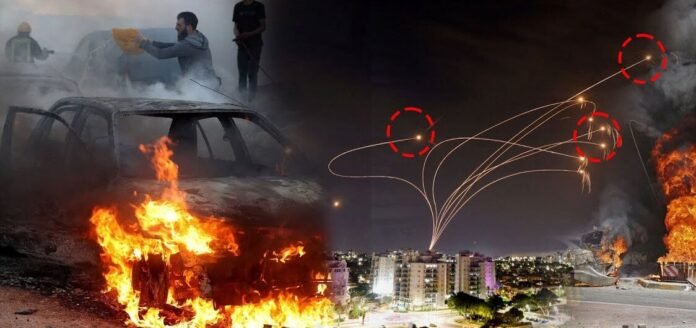Hamas claims rocket attack on Ashkelon; IDF vows harsh response amid rising Gaza casualties
Hamas launched ten rockets at southern Israel on Sunday night, striking the city of Ashkelon and injuring a 30-year-old man in the most intense barrage since the collapse of the recent ceasefire agreement.
The Israel Defense Forces (IDF) reported that five of the rockets were intercepted by air defences. At least one struck a populated area in Ashkelon, injuring the man with shrapnel. He was transported to Barzilai Hospital, while others were treated for anxiety and injuries sustained while rushing to shelters.
The rockets were fired from Deir al-Balah in central Gaza, an area where the IDF has not recently operated. Hamas swiftly claimed responsibility for the attack.
In response, Prime Minister Benjamin Netanyahu — currently en route to the United States — spoke with Defence Minister Israel Katz from his aircraft and instructed him to deliver a strong military response. Katz directed the IDF to expand operations in Gaza, declaring, “For every piece of shrapnel that hits a resident of Ashkelon, the Hamas murderers will pay a very heavy price.”
Shortly after the barrage, the IDF issued an evacuation warning to civilians in Deir al-Balah and launched a drone strike targeting the rocket launcher used in the attack. Footage circulated online showed a rocket exploding near residential buildings in Ashkelon, highlighting the continued threat to civilian life.
This attack is the most significant rocket assault since the breakdown of the ceasefire and hostage deal last month. The initial agreement, implemented between January and March, saw the release of 30 hostages by Hamas and the return of eight bodies. Phase two of the deal — which would have involved a full Israeli withdrawal from Gaza and the release of all remaining living hostages — was rejected by Netanyahu, who argued it would allow Hamas to regroup.
Instead, Israel resumed military operations on 18 March, halting aid deliveries to Gaza and intensifying strikes across the Strip. Katz reaffirmed that the IDF’s current strategy would now “continue and widen” under his direction.
The Hamas-run health ministry in Gaza, which does not distinguish between combatants and civilians in its figures, claims over 1,000 Palestinians have died in the renewed offensive. On Sunday alone, at least 32 people were reported killed, including women and children.
Strikes hit a tent and house in Khan Younis overnight, killing 15 people, including five children. Separate strikes in Jabalia and Gaza City reportedly claimed ten more lives, with one hitting a bakery queue. In Deir al-Balah, seven more bodies — including three women and a child — were delivered to a local hospital.
The current war began after Hamas’s surprise cross-border invasion on 7 October 2023, when around 1,200 people, mostly civilians, were killed in southern Israel and 251 hostages taken. According to Israeli intelligence, 59 of those hostages remain in captivity, 24 of whom are believed to be alive.
A brief truce in November 2023 resulted in the release of over 100 hostages. During the more recent ceasefire, Hamas released 20 Israeli civilians, five soldiers, and five Thai nationals, alongside eight bodies.
As tensions escalate, international observers are bracing for another round of intense violence, with Israel now vowing to escalate its campaign following Hamas’s renewed rocket attacks.
